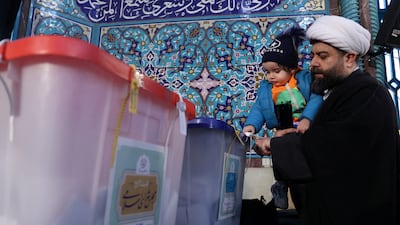Participation in Iran’s elections for parliament on Friday was at a record low despite extended voting hours, unofficial reports suggest.
Around 61 million Iranian people were eligible to vote, including 3.5 million first-time voters, according to state news agency Irna.
However, only about 25 million people voted, which translates into a turnout of about 40 per cent, the Tasnim news agency said, citing reports in unnamed unofficial media.
The electoral authority is expected to release an official figure later on Saturday. The previous lowest turnout was 42 per cent in the 2020 parliamentary election.
Authorities twice extended voting hours on Friday to keep polling centres open until midnight in the first national election since mass anti-government protests sparked by the death in custody of Mahsa Amini in September 2022.
Leaders had called on Iranians to vote in large numbers, with Supreme leader Ayatollah Ali Khamenei warning them that the world was watching the election.
“Onlookers from all over observe the affairs of our country; make friends happy and ill-wishers disappointed,” he said while casting his vote in Tehran.
The vote is being held as Iranians struggle with soaring inflation and amid heightened regional tensions over the Israel-Gaza war.
Iranians were also electing the Assembly of Experts, which elects the country’s supreme leader.
Several winners of parliamentary and Assembly of Experts seats emerged on Saturday morning from early counts, Tasnim said.
Candidates for parliament are vetted by the Guardian Council, whose members are either appointed or approved by the supreme leader.
They approved 15,200 candidates out of nearly 49,000 applicants to run for seats in the 290-member parliament.
Analysts expect conservatives and ultra-conservatives, who won 232 out 290 seats in the 2020 election after reformist and moderate candidates were disqualified, to dominate once again.
Conservatives are also expected to maintain a firm grip on the Assembly of Experts, an 88-member body exclusively made up of male Islamic scholars.

